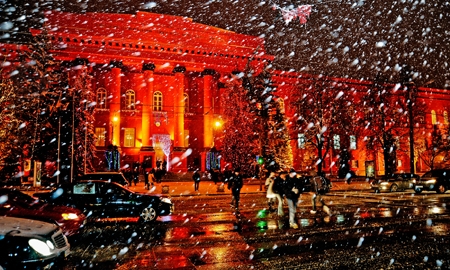The foundations of higher education in Ukraine were laid in the 16th and 17th centuries, when urban populations began to organise fraternities, which began printing books and opening schools. In 1632, the first institution of higher education in Ukraine – Kyiv-Mohyla College (now KNU) – was created with the unification of the Kyiv and the Lavra brotherhood schools. The new college accepted students mainly of the upper classes, government officials, priests, rich burghers and Cossacks. Students were instructed in languages, along with poetic and rhetorical skills, Greek and Roman literature, philosophy, and theology.
The college, and others that followed, acquired a reputation for excellence, in particular in the sciences – a characteristic that was strengthened down the centuries. However, Ukraine’s Zerkalo Nedeli newspaper has reported that the communist leadership took unprecedented steps to ruin the Ukrainian school of maths and other sciences after the Bolshevik coup in 1917. The famous Kyiv school of algebra was liquidated and scientific attentions moved to Moscow, which became the scientific focal point. During the decades that followed, gifted graduates went to Moscow and to universities that practiced USSR-wide “wunderkinder” selection. Nonetheless, the achievements of Ukrainian scientists of the Soviet years in areas such as cybernetics and space exploration remain redoubtable.
After the Soviet Union broke up, the best and brightest were no longer dispatched. Numbers of Ukrainian graduates rose significantly and many stayed in their homeland to teach. Ukrainian students continue to win an impressive, if not unprecedented, number of prizes at international competitions, especially in maths. Ukraine now has a huge academic potential of brilliant teachers and talented students and nearly 100 per cent literacy.
After independence, Ukraine began updating the content, forms and methods of teaching to increase the intellectual potential and international allure of the country.
In recent years, further reforms have been initiated, which included merging or closing down a great number of the smaller universities, and actively developing scientific and research activity in the larger institutions. The aim was to provide them with substantial funding for scientific research so that they achieve, and surpass, international levels of excellence.
Kyiv National University (KNU) – commonly referred to as “the Harvard of Ukraine” – is the country’s flagship university. It has more faculties and departments than any other comparable Ukrainian institution and provides specialist training in a greater number of fields. It employs more than 2,000 academic and 1,000 scientific staff: 82 per cent of lecturers have academic degrees and status.
We constantly study the labour market and see there is no underemployment problem among our graduates” Prof Anatoly Pavlenko,
Rector of Kyiv National
Economic University
The majority of traditional Ukranian universities have retained a very powerful scientific basis” Prof Leonid Huberskyi,
Rector of Kyiv
National University |
“We have very strong human resources. More than 500 of our employees are professors with PhDs, and nearly 1,300 PhD-level associate professors. This is the potential that no other university in Ukraine has,” says Prof Leonid Huberskyi, rector of KNU.
Close cooperation with the National Academy of Sciences is another contributor to success. Alumni of the academy are engaged to teach and act as scientific advisors, as well as manage dissertations. Students also get to perform research throughout the academy’s many institutions. Two years ago, a research park was created and there are plans to further engage the academy in business and manufacturing, in particular in the field of applied research. The university works closely with Samsung, MTS, Intel, Microsoft and other market leaders. The Department of Cybernetics recently signed an agreement with Microsoft, which has provided the faculty with a supercomputer. “International cooperation brings us very significant results,” says Prof Huberskyi.
Research activities in nanotechnology, biotechnology and high technology are keenly promoted, and KNU recently initiated a teaching-research centre where just 75 Master’s students are enrolled. “We aim to individually prepare genuine scientific elite,” says the rector.KNU enjoys cooperation agreements with leading universities worldwide. Their Institute of Biology cooperates with the German Technical Institute on a research programme in biotechnology that aims to identify markers of cancer. In addition, their Institute of Chemistry cooperates closely with the University of Toulouse. “Our professors and graduates go to there for training, and their professors, including even the Nobel Prize winners, come to us,” says Prof Huberskyi.
Kyiv National Economic University (KNEU) is the largest economic higher educational establishment in Ukraine and is highly respected in economic-academic circles. Founded in 1906, it had 229 students and 22 teachers; today, more than 36,000 students are enrolled on its courses.
“During the Soviet times, we had a very powerful scientific basis. The majority of traditional Ukrainian universities, the ones that were established before the war or even before the revolution, retained this positive feature: fundamentality and a scientific grounding of education. Only education which is seriously backed up by science has high quality,” says KNEU’s rector, Prof Anatoly Pavlenko. “At KNEU we have successfully managed to retain this high quality basic education.”
The quality of KNEU graduates is renowned; both business and government representatives often select students still in the third year of their studies. KNEU also regularly conducts large career fairs, in which 30 to 40 of the best Ukrainian companies participate.
“We constantly study the labour market and see that there is practically no unemployment problem among our graduates. This, we believe, is a good indicator,” says Prof Pavlenko, who also underlines the need for international collaboration.
“Ukraine ranks first among European countries in terms of consumption of energy and we take pains to establish cooperation with foreign scientists in the development of alternative energy sources and energy efficient technologies,” says Prof Pavlenko.

1 COMMENT
Thanks for this helpful information and I hope to visit Kiev again soon.